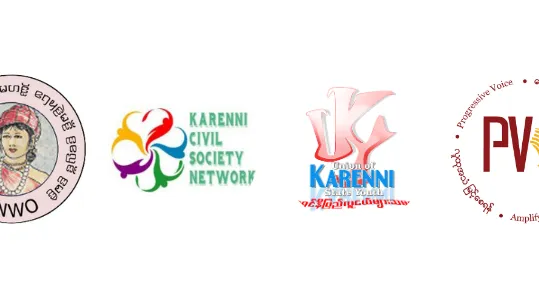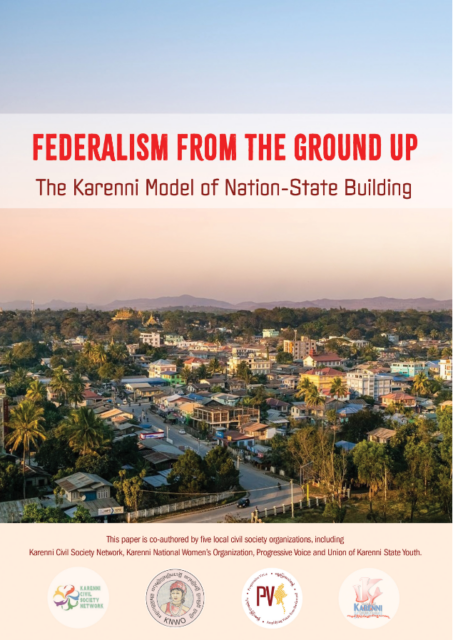Federalism from the Ground Up: The Karenni Model of Nation-State Building
09 October 2024

Executive Summary
In the aftermath of the Myanmar military junta’s failed coup, the Myanmar people have endured the junta’s nationwide campaign of terror. They have also suffered an economic catastrophe and a worsening human rights and humanitarian crisis, all caused and exacerbated by the junta. Despite these, a multidimensional people’s revolution, which has emerged across most of the country’s territory, is building a new and inclusive Myanmar. In the liberated areas, bottom-up people’s representative bodies, together with the pre-existing administrations of ethnic resistance organizations (EROs), are governing civilians, protecting them from the junta’s atrocities, and delivering much-needed public services.
The paper Federalism from the Ground Up: The Karenni Model of Nation-State Building is co-authored by five Myanmar civil society organizations, including Karenni Civil Society Network, Karenni National Women’s Organization, the Union of Karenni State Youth, and Progressive Voice. It examines the establishment and development of the Karenni Interim Government, which is pioneering federal state-building from the ground up as part of the nationwide response to the Myanmar military junta’s failed coup. The revolutionary federal state-building process in Karenni State is shaped by ongoing efforts to institutionalize inclusive, decentralized governance that reflects the Karenni peoples’ long-standing political aspirations for self-determination within a federal democratic union of Myanmar.
Arising from a collaboration between multiple revolutionary forces, political parties, civil society organizations (CSOs), and youth and women’s groups, the Karenni Interim Government operates under the framework of the Karenni State Interim Arrangement (KSIA). Central to the Karenni interim governance system is the Karenni State Consultative Council (KSCC), the policy-making body, which promotes multi-ethnic collaboration and acts as a checks and balances mechanism during the revolutionary period.
The executive branch, the Interim Executive Council (IEC), plays a pivotal role in developing a decentralized multi-actor public administration mechanism that coordinates the provision of essential public services such as education, healthcare, and humanitarian aid. The legislative branch, the Karenni State Interim Parliament (KSIP), comprises 15 representatives—all elected Members of Parliament from Myanmar’s 2020 General Election—and is responsible for law-making, monitoring the activities of the IEC, and institutionalizing legislative processes through democratic, standardized procedures. The KSIP has formed specialized working committees to review, draft, and scrutinize laws, ensuring transparency in the legislative process. It also collaborates with the KSCC to enact laws that reflect the needs of the community and uphold the principles of the KSIA.
The judicial branch, the Karenni State Interim Judiciary (KSIJ), comprises a Supreme Court, as well as District and Township Courts. The KSIJ acknowledges the legitimacy of the EROs’ judicial systems and courts, and it permits local traditional laws and judicial practices to be incorporated into the current system in instances where they do not contravene human rights principles. Under the interim judiciary system, both military and civilian judicial systems are maintained as distinct entities.
Together as the Karenni interim governance system, the KSCC, the IEC, the KSIP, and the KSIJ reflect the Karenni people’s commitment and aspiration to building inclusive, democratic governance structures during the revolutionary period, and pioneering the transition to a federal democratic union of Myanmar.
The paper conceptualizes the evolving governance system in Karenni State as a multi-level inclusive governance system (MIGS). Through the analytical lenses of legitimacy, inclusivity, hybridity, and sustainability, it investigates how the MIGS integrates newly formed bottom-up governance initiatives with EROs’ pre-existing administrations to create a representative and democratic public administration in Karenni State. The paper further offers concrete examples of the Karenni Interim Government’s striving to ensure inclusive participation of the Karenni peoples in its bottom-up administration and at every level of decision-making.
Articulated in the KSIA, the Karenni governance model not only advances the political objectives of the Karenni peoples but also contributes to the broader federal democratic aspirations of the Myanmar people’s Spring Revolution. It stands to serve as a critical blueprint for Myanmar’s first-ever domestically driven federal system, integrating both existing and newly established governance structures. Grounded in people-led community participation and reflective of the historical and socio-political dynamics on the ground, the Karenni governance model aims to ensures that legitimacy comes from the active representation of all Karenni peoples at all levels of government. On the ground, this participatory approach is fostering trust and empowering communities across Karenni State, establishing a thriving governance system based on inclusion and accountability.
By bridging revolutionary efforts with post-interim federal state-building, the Karenni model is strengthening local democratic governance while laying the foundations for long-term stability, the rule of law, and justice across Myanmar. As such, greater international recognition and support for the Karenni model of nation-state building and other people-led interim governance systems are urgently needed to move towards a peaceful and inclusive federal democratic Myanmar.
This paper draws on desk research and qualitative fieldwork, including findings from semi-structured interviews and focus group discussions in Karenni State and along the Thailand-Karenni border. The interviews were conducted in-person and online with local administrators, CSOs, and members of the Karenni Interim Government between March and early May 2024.
Recommendations
To the International Community and Donors
- Cut all ties with the Myanmar military junta, including any direct or indirect engagement with the military junta;
- Recognize and engage with the Karenni Interim Government as the legitimate representative of the Karenni peoples;
- Impose and enforce coordinated and targeted sanctions on arms, aviation fuel and dual-use goods to end the military junta’s terror campaign against the people;
- Provide technical and financial support to the Karenni Interim Government—including for infrastructure, demining, administration, communication, and justice mechanisms—to be able to implement effective governance, civilian protection, and humanitarian aid provision;
- Engage, consult, and collaborate with the Karenni Interim Government on public service provision to the people;
- Consult and provide technical and financial support to people’s administrative systems established during the revolution to strengthen the vital work of local governance mechanisms, including but not limited to those in Karenni State;
- Increase and direct humanitarian support to local frontline responders, including civil society and community-based organizations, through locally led cross-border channels; and
- Review funding strategies and revise them to include or create flexible requirements that make funding more accessible and less burdensome for local civil society and community-based organizations, frontline humanitarian responders, and other stakeholders.
To the KSCC, the IEC, the KSIP, and the KSIJ
- Ensure the full and meaningful participation of women, youth, ethnic and religious minorities, and other minority communities, including the LGBTQIA+ community and people with disabilities, at every level of decision-making in building a new Karenni State, and ensure all marginalized groups are meaningfully engaged and represented in all societal, economic, and political spheres;
- Ensure the integration of the LGBTQIA+ community, people with disabilities, and ethnic and religious minorities into the Karenni Interim Government’s policies;
- Strengthen the recognition of and respect for cultures and traditional practices of local communities while ensuring the practices do not undermine the rights of women, children, religious and ethnic minorities, and marginalized communities;
- Increase practical efforts to overcome traditional, cultural, and religious barriers in order to eliminate entrenched misogynistic and patriarchal norms and practices;
- Strengthen the standardization process of the people’s administration to ensure the efficient functioning of local governance mechanisms;
- Strengthen communication with local administrations to avoid miscommunication and marginalization, especially for remote communities in Karenni State;
- Disengage with United Nations agencies and international non-governmental organizations that work with or sign a Memorandum of Understanding (MoU) with the junta in providing humanitarian aid provision;
- Facilitate the delivery of humanitarian aid, not only to the IDP areas that are directly impacted by the junta’s ongoing terror campaign, but also to the rural and remote communities within Karenni State that are indirectly affected by the nationwide crisis; and
- Ensure that humanitarian assistance is delivered in a manner that preserves social harmony and avoids heightening tensions between different communities.
Announcements
21 May 2025
Open letter: Malaysia must lead ASEAN with principle, not hypocrisy, to address the Myanmar crisis

Progressive Voice is a participatory rights-based policy research and advocacy organization rooted in civil society, that maintains strong networks and relationships with grassroots organizations and community-based organizations throughout Myanmar. It acts as a bridge to the international community and international policymakers by amplifying voices from the ground, and advocating for a rights-based policy narrative.
